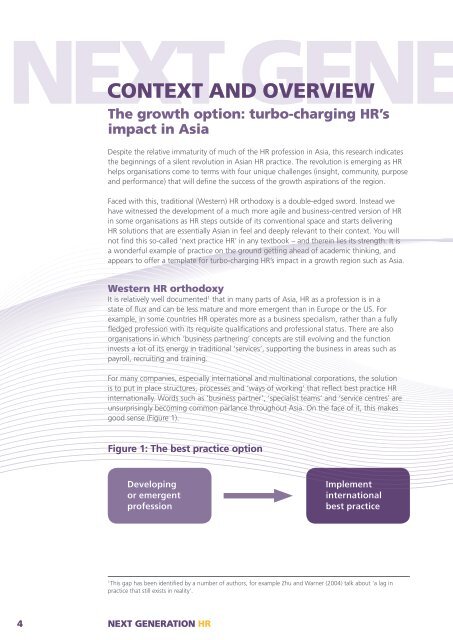NEXT GENERATION HR - CIPD
NEXT GENERATION HR - CIPD
NEXT GENERATION HR - CIPD
Create successful ePaper yourself
Turn your PDF publications into a flip-book with our unique Google optimized e-Paper software.
<strong>NEXT</strong> GENE<br />
The growth option: turbo-charging <strong>HR</strong>’s<br />
CONTEXT AND OVERVIEW<br />
impact in Asia<br />
Despite the relative immaturity of much of the <strong>HR</strong> profession in Asia, this research indicates<br />
the beginnings of a silent revolution in Asian <strong>HR</strong> practice. The revolution is emerging as <strong>HR</strong><br />
helps organisations come to terms with four unique challenges (insight, community, purpose<br />
and performance) that will define the success of the growth aspirations of the region.<br />
Faced with this, traditional (Western) <strong>HR</strong> orthodoxy is a double-edged sword. Instead we<br />
have witnessed the development of a much more agile and business-centred version of <strong>HR</strong><br />
in some organisations as <strong>HR</strong> steps outside of its conventional space and starts delivering<br />
<strong>HR</strong> solutions that are essentially Asian in feel and deeply relevant to their context. You will<br />
not find this so-called ‘next practice <strong>HR</strong>’ in any textbook – and therein lies its strength. It is<br />
a wonderful example of practice on the ground getting ahead of academic thinking, and<br />
appears to offer a template for turbo-charging <strong>HR</strong>’s impact in a growth region such as Asia.<br />
Western <strong>HR</strong> orthodoxy<br />
It is relatively well documented 1 that in many parts of Asia, <strong>HR</strong> as a profession is in a<br />
state of flux and can be less mature and more emergent than in Europe or the US. For<br />
example, in some countries <strong>HR</strong> operates more as a business specialism, rather than a fully<br />
fledged profession with its requisite qualifications and professional status. There are also<br />
organisations in which ‘business partnering’ concepts are still evolving and the function<br />
invests a lot of its energy in traditional ‘services’, supporting the business in areas such as<br />
payroll, recruiting and training.<br />
For many companies, especially international and multinational corporations, the solution<br />
is to put in place structures, processes and ‘ways of working’ that reflect best practice <strong>HR</strong><br />
internationally. Words such as ‘business partner’, ‘specialist teams’ and ‘service centres’ are<br />
unsurprisingly becoming common parlance throughout Asia. On the face of it, this makes<br />
good sense (Figure 1).<br />
Figure 1: The best practice option<br />
Developing<br />
or emergent<br />
profession<br />
Implement<br />
international<br />
best practice<br />
1<br />
This gap has been identified by a number of authors, for example Zhu and Warner (2004) talk about ‘a lag in<br />
practice that still exists in reality’.<br />
4<br />
<strong>NEXT</strong> <strong>GENERATION</strong> <strong>HR</strong>

















